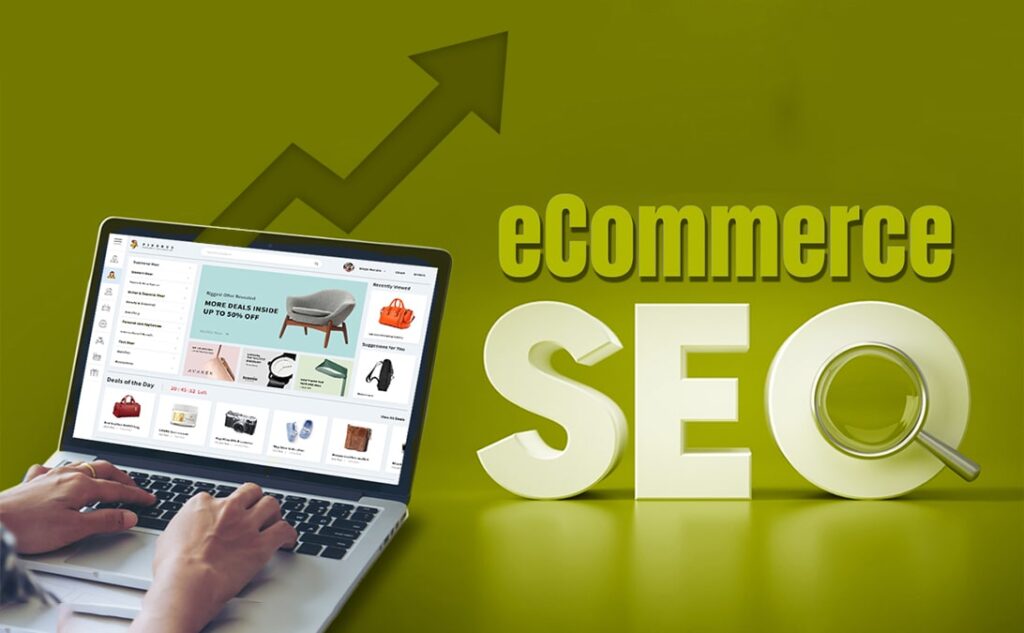In the modern digital landscape, ecommerce SEO has emerged as a pivotal strategy for business growth. As more consumers turn to online shopping, businesses must prioritize their visibility on search engines to capture a significant share of this lucrative market. Understanding and implementing effective ecommerce SEO practices can lead to substantial benefits, including increased traffic, higher conversion rates, and sustained long-term growth.
What is Ecommerce SEO?
Ecommerce SEO is the practice of optimizing an online store to rank higher in search engine results pages (SERPs). This involves enhancing various elements of the website to improve its visibility for relevant keywords. Key aspects include optimizing product pages, category pages, and overall site architecture to ensure search engines can easily index and rank the site.
Key Elements of Ecommerce SEO
- Keyword Research: Identifying the right keywords is the foundation of effective ecommerce SEO. This involves understanding what terms potential customers use when searching for products and services similar to yours.
- On-Page SEO: This includes optimizing product titles, descriptions, images, and metadata to ensure they align with targeted keywords. Each product page should be a well-optimized landing page that provides valuable information to both users and search engines.
- Technical SEO: Ensuring that your website’s technical aspects, such as site speed, mobile-friendliness, and secure connections (HTTPS), are optimized. These factors are crucial for improving user experience and search engine rankings.
- Content Marketing: Creating valuable content that attracts and engages your target audience. This can include blog posts, guides, and videos that answer common questions and provide useful information related to your products.
- Link Building: Acquiring high-quality backlinks from reputable sites to enhance your site’s authority and trustworthiness in the eyes of search engines.
The Importance of Ecommerce SEO for Business Growth
1. Increased Visibility and Traffic
By optimizing your ecommerce site for search engines, you increase its visibility to potential customers. Higher visibility means more traffic to your site. When done correctly, ecommerce SEO helps you rank for both broad and long-tail keywords, capturing a wide audience and driving consistent traffic to your store.
2. Higher Conversion Rates
Effective ecommerce SEO not only drives traffic but also attracts the right kind of traffic. By targeting specific, intent-driven keywords, you bring in visitors who are more likely to make a purchase. This targeted approach results in higher conversion rates and better return on investment (ROI) for your marketing efforts.
3. Cost-Effective Marketing
Compared to paid advertising, SEO is a cost-effective strategy. While it requires an initial investment in time and resources, the long-term benefits far outweigh the costs. Once your site achieves strong rankings, you can enjoy a steady stream of organic traffic without ongoing ad spend.
4. Enhanced User Experience
Part of ecommerce SEO involves improving the overall user experience (UX) of your website. Fast loading times, easy navigation, and mobile optimization are all critical components. A better UX not only helps with SEO but also increases customer satisfaction and retention.
5. Competitive Advantage
In the competitive ecommerce landscape, SEO can be the differentiating factor that sets your business apart. By outranking competitors for key search terms, you capture more market share and position your brand as a leader in your industry.
Strategies for Effective Ecommerce SEO
1. Optimize Product Descriptions
Crafting unique, detailed, and keyword-rich product descriptions is essential. Avoid duplicate content and focus on providing comprehensive information that addresses potential customer queries. Include primary and secondary keywords naturally within the content.
2. Use High-Quality Images and Videos
High-quality images and videos can significantly enhance product pages. Optimize these media files by compressing them to reduce load times and using descriptive, keyword-rich filenames and alt text.
3. Improve Site Architecture
A well-organized site architecture helps search engines crawl and index your site more effectively. Use a logical hierarchy for categories and subcategories, and ensure that every page is reachable within a few clicks from the homepage.
4. Leverage Customer Reviews
Customer reviews add fresh, user-generated content to your product pages, which can improve rankings. Encourage satisfied customers to leave reviews and respond to them promptly to build trust and engagement.
5. Optimize for Mobile
With the increasing number of mobile shoppers, optimizing your ecommerce site for mobile devices is crucial. Ensure your site is responsive, loads quickly on mobile devices, and provides an intuitive user experience.
6. Implement Schema Markup
Schema markup helps search engines understand your content better and can enhance your SERP listings with rich snippets. Use schema markup to provide detailed information about your products, such as price, availability, and reviews.
7. Focus on Local SEO
For ecommerce businesses with physical locations, local SEO is important. Optimize your site for local search terms and create a Google My Business profile to increase visibility in local search results.
Measuring the Success of Ecommerce SEO
To ensure your ecommerce SEO efforts are effective, it’s important to measure their success regularly. Key metrics to monitor include:
- Organic Traffic: Track the number of visitors coming to your site from search engines.
- Conversion Rate: Measure the percentage of visitors who make a purchase.
- Bounce Rate: Monitor the rate at which visitors leave your site after viewing only one page.
- Average Session Duration: Track how long visitors stay on your site.
- Keyword Rankings: Monitor your rankings for targeted keywords to ensure continuous improvement.
Conclusion
Investing in ecommerce SEO is essential for driving business growth in today’s competitive online marketplace. By increasing visibility, attracting targeted traffic, and improving user experience, ecommerce SEO can lead to higher conversion rates and sustained growth. Implementing effective SEO strategies ensures your online store stands out, captures more market share, and delivers a superior shopping experience to your customers.







